
Here's what we know so far after federal agents arrested two firefighters on Wednesday.
30.08.2025 07:26 — 👍 4 🔁 4 💬 0 📌 1@vizscience.bsky.social
Distilling complex concepts into beautiful visuals 📰 Graphic Artist & Science Illustrator at The Seattle Times 🎨 Founder of Visualizing Science 🌎 Climatebase Fellow 🏆 Pulitzer Finalist https://www.visualizingscience.com

Here's what we know so far after federal agents arrested two firefighters on Wednesday.
30.08.2025 07:26 — 👍 4 🔁 4 💬 0 📌 1



Recently I created a #cutaway diagram of a glacier in retreat, and what causes/accelerates melting. Also, #illustrations of animals and plants that may disappear as alpine meadows are lost 🏔️ Drawn digitally in pen-and-ink style. Read more at www.seattletimes.com/seattle-news... #sciart #climate
29.08.2025 19:32 — 👍 6 🔁 0 💬 1 📌 0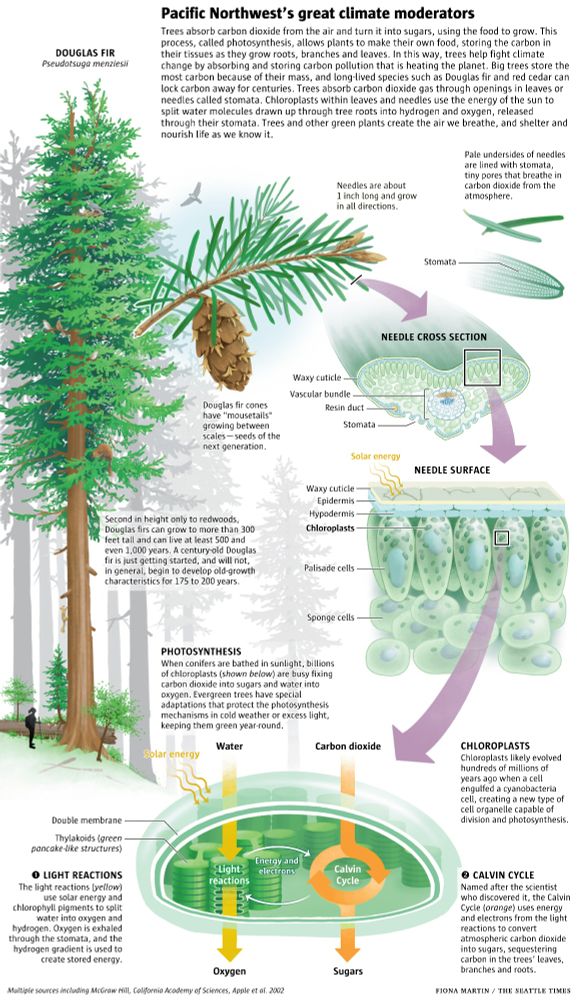
Print version of graphic. Trees absorb carbon dioxide from the air and turn it into sugars, using the food to grow. This process, called photosynthesis, allows plants to make their own food, storing the carbon in their tissues as they grow roots, branches and leaves. In this way, trees help fight climate change by absorbing and storing carbon pollution that is heating the planet. Big trees store the most carbon because of their mass, and long-lived species such as Douglas fir and red cedar can lock carbon away for centuries. Trees absorb carbon dioxide gas through openings in leaves or needles called stomata. Chloroplasts within leaves and needles use the energy of the sun to split water molecules drawn up through tree roots into hydrogen and oxygen, released through their stomata. Trees and other green plants create the air we breathe, and shelter and nourish life as we know it.

Mobile version of graphic. Trees absorb carbon dioxide from the air and turn it into sugars, using the food to grow. This process, called photosynthesis, allows plants to make their own food, storing the carbon in their tissues as they grow roots, branches and leaves. In this way, trees help fight climate change by absorbing and storing carbon pollution that is heating the planet. Big trees store the most carbon because of their mass, and long-lived species such as Douglas fir and red cedar can lock carbon away for centuries. Trees absorb carbon dioxide gas through openings in leaves or needles called stomata. Chloroplasts within leaves and needles use the energy of the sun to split water molecules drawn up through tree roots into hydrogen and oxygen, released through their stomata. Trees and other green plants create the air we breathe, and shelter and nourish life as we know it.
So happy this illustration was accepted into GNSI's annual exhibit! Learn about how trees lock away carbon for centuries—and competing economic interests—in these @seattletimes.com stories: bit.ly/4mwCOqV, bit.ly/4lUk9Fq
Exhibit:
www.gnsi.org/2025-gnsi-ju...
#evergreen #photosynthesis #sciart

A photo of a handful of people standing in a gallery space talking informally in groups. There is an exhibition of science art on the walls in the background.
Time is running out to register for the 2025 GNSI Visual SciComm Conference! Register by June 12th to take full advantage of our July 13 - 19 conference in Bridgewater, Massachusetts.
Learn more and register here: www.gnsi.org/Visual-SciCo...

View of the water from second car deck on the Walla Walla
Sometimes I get lucky with the mobile office view
#ferry #ferrycommute #WSDOT #Seattle #WashingtonState
Thanks Sally! I feel so lucky to be working with some of the best writers in the biz, Mike Reicher and Lynda Mapes.
17.05.2025 03:43 — 👍 1 🔁 0 💬 0 📌 0This is a science 🧪 story about Mount St Helens, and gophers, and how small positive actions can, in time, make a big difference. I thought a few of you might need to hear it this week. (1/x) 🧵
23.01.2025 21:45 — 👍 262 🔁 104 💬 7 📌 22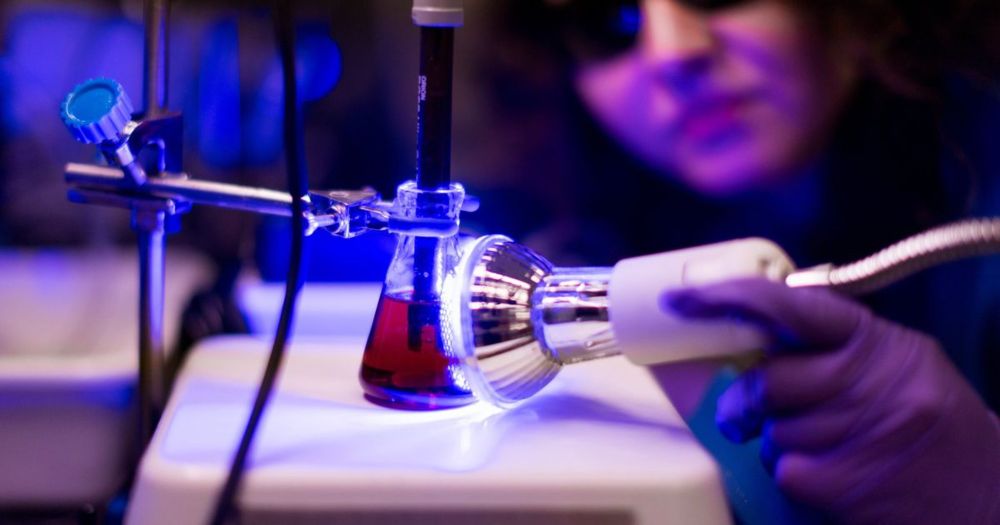
Washington is turning into a hotbed for carbon capture, removal and storage work.
What the heck is all that stuff anyway? Does it, like, work? Or is it all hype?
www.seattletimes.com/seattle-news...

An editorial piece I did in 2020. This one was for the New Republic about the California wildfires and what it means to be a Californian during such intense times of climate change
I enjoyed how this one turned out, and as a person who was born and raised in CA it was near and dear to my heart
This might be my favorite art challenge. Who else is doing this? @gnsiart.bsky.social #sciart #scicomm #vizscicomm
11.01.2025 23:51 — 👍 38 🔁 7 💬 3 📌 0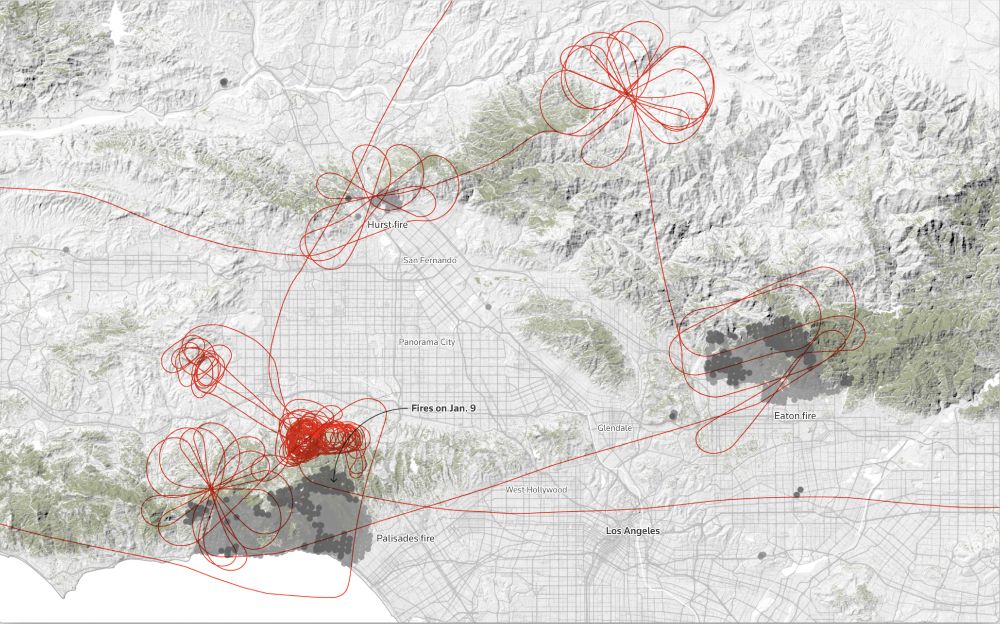
Map of flight paths around the Los Angeles fires. Flight paths are indicated by red lines, roads by gray lines, forested areas with muted green, and active fires with dark gray dots. The map is accented by hill shading.
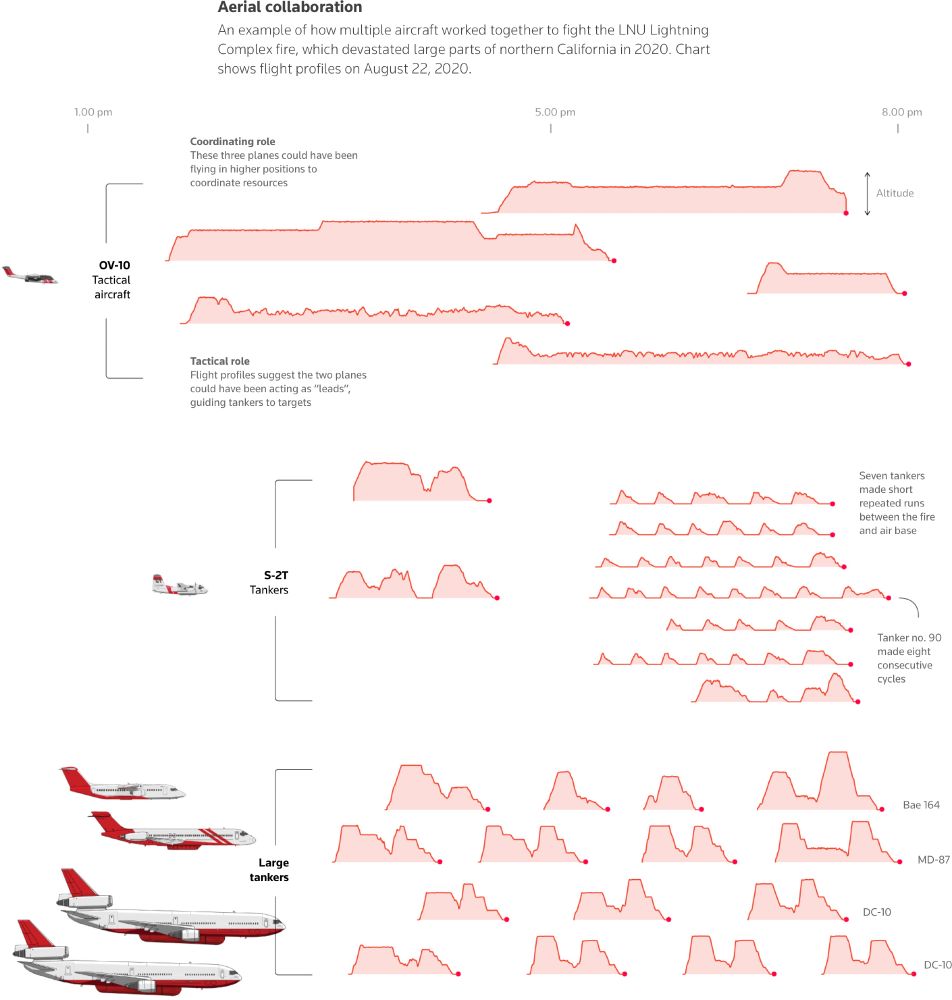
Annotated graphs of altitude and flight times for observation aircraft and tankers, showing coordination of the fleet.
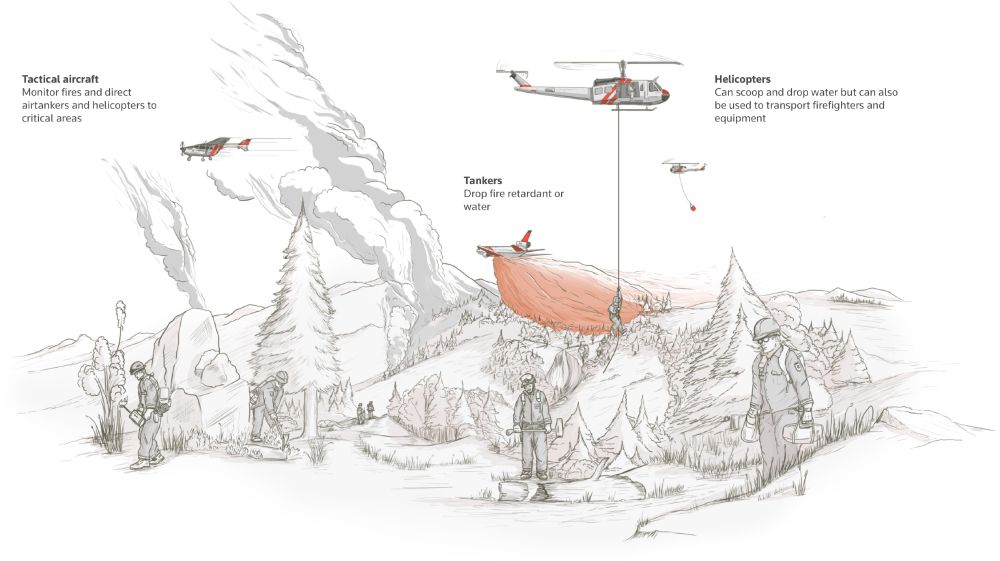
Hand-drawn illustration showing how helicopters and aircraft are used to dump water and flame retardant to help fight wildfires.
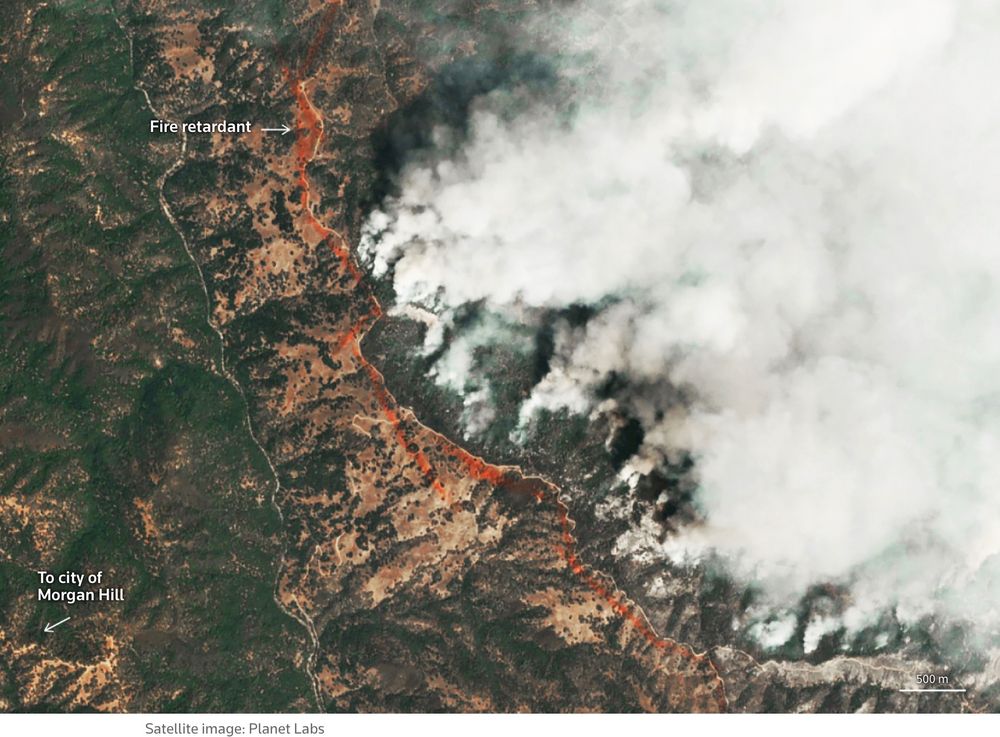
High-resolution color satellite image showing red flame retardant laid in front of an advancing fire with copious smoke.
The graphics in this @reuters.com article on air tankers battling the fires in LA are astonishingly good.
www.reuters.com/graphics/CAL...
via @interactives.bsky.social

Refined sketch with attention given to proportions and details, as well as the overall composition.

Rough thumbnail illustrations (business card–sized) help me to narrow the scope and decide what I want to show.

The final illustration shows a close-up of bull kelp in the foreground, with part of the bulb cut away to show that it's hollow and filled with air. Another inset shows the holdfast that anchors the kelp to rocks. The background illustration shows a sample bull kelp forest from sea floor to surface, where the fronds sprawl out to create a floating canopy. The underwater forest provides both shelter and food to a rich array of life, from shellfish to salmon.
Happy #WIP Wednesday. Here's some sketches behind an illo I created about bull #kelp. Research included a survey by boat off Burrows Island with Samish Dept. of Natural Resources. Full story: www.seattletimes.com/seattle-news.... Writing by @conradswanson.bsky.social; photos by Nick Wagner. #sciart
09.01.2025 04:35 — 👍 25 🔁 5 💬 0 📌 0Show me your pet and what they are named after:
23.11.2024 08:49 — 👍 1 🔁 0 💬 0 📌 0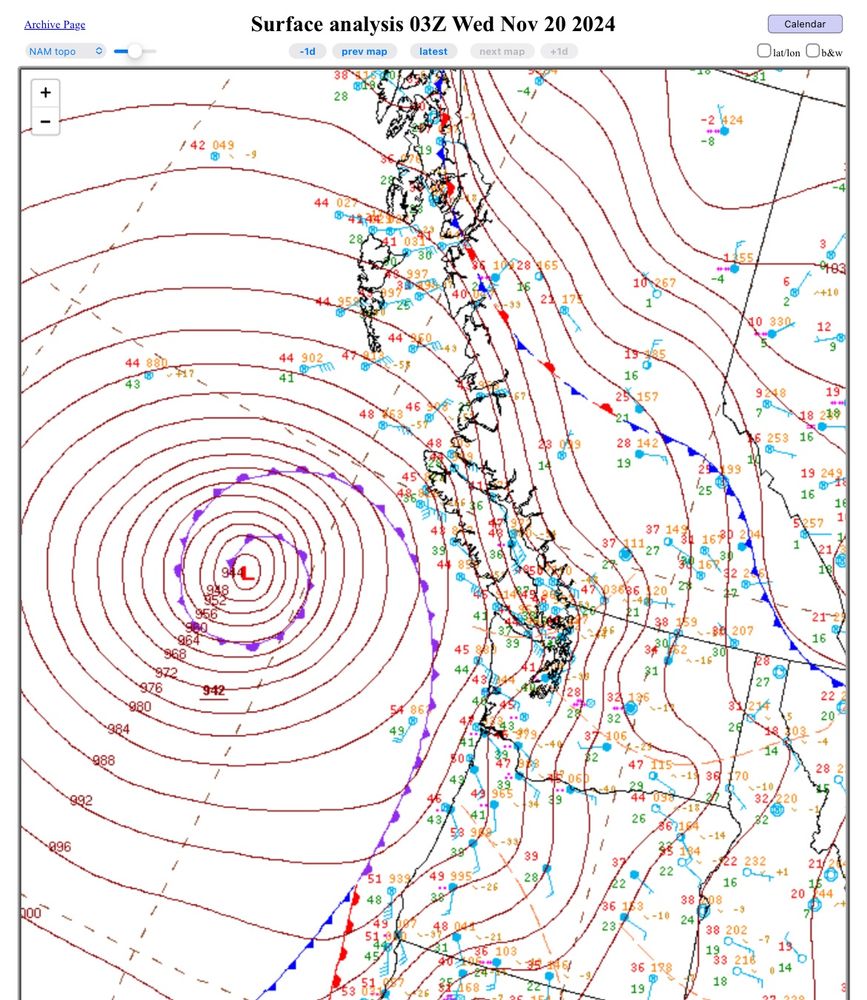
942mb bomb cyclone!! Likely the lowest pressure ever recorded in this area of the Pacific Ocean #wawx
20.11.2024 06:13 — 👍 108 🔁 30 💬 3 📌 3

When left alone, nature will regulate itself… log-jammed, braided rivers that once covered the PNW naturally slowed, spread, and filtered water as it made its way to the sea, providing varied habitats for salmon, beavers, and more 🪵Read more at www.seattletimes.com/seattle-news...
20.11.2024 06:07 — 👍 1 🔁 0 💬 0 📌 0
Bull kelp off Burrows Island, WA

Bull kelp
Post a picture you took (no description) to bring some zen to the timeline
20.11.2024 05:45 — 👍 1 🔁 0 💬 0 📌 0Count me in! Looking forward to meeting some of you. Science illustrator and graphic artist nerd from Seattle Times 👩🎨
06.01.2024 03:51 — 👍 1 🔁 0 💬 1 📌 0
Banner for the Sci Art September art challenge. The banner features a sketch, as an example of art to create during the event. It also features the following text: Hashtag Sci Art September. Month-long art challenge. Following that is the 30-word prompt list, included here: 1 Starry, 2 Battle, 3 Favourite, 4 Cold-Blooded, 5 Strangling, 6 Understory, 7 Indigo, 8 Simian, 9 Heart, 10 Gossamer, 11 Lyrical, 12 Overgrowth, 13 Carmine, 14 Glowing, 15 Bird-like, 16 Ochre, 17 Abstract, 18 Talon, 19 Charcoal, 20 Sweet, 21 Misty, 22 Nocturnal, 23 Adornment, 24 Metallic, 25 Alchemical, 26 Threads, 27 Amethyst, 28 Monumental, 29 Tale, 30 Rebirth. After the list is the following text: Hosted by @FlyingTrilobite and @LizLagomorph. Year 3, September 2023.
#SciArtSeptember Year 3!
Upcoming monthly art challenge: for drawing + sharing creatures, geology, archaeology, and your other favourite objects of study (or affection).
-
🐡 🎨
Thank you Glendon! Curious, why the puffer fish? 🐡 Love it tho (marine bio major here)
09.08.2023 20:42 — 👍 0 🔁 0 💬 1 📌 0
Infographic explaining how chocolate products can get contaminated with cadmium (mostly from soils) and lead (mostly dust polluted from lead gasoline or lead paint). This happens more often in poorer countries where farmers are not paid a living wage 🙁 That said there are safer brands out there. Originally published in Seattle Times February 2023.
Hello Blue! I’m a science illustrator/designer, and enjoy interpreting info visually. When done well, art is like a universal language. Combined with text, it becomes a rich storytelling experience. Honored to work with talented authors and scientists, learning more w/each project. #sciart #scicomm
09.08.2023 20:35 — 👍 19 🔁 2 💬 0 📌 0